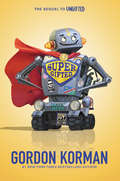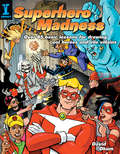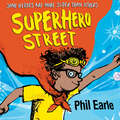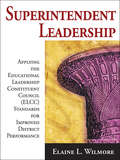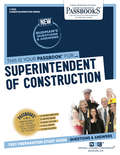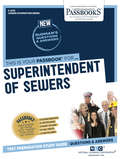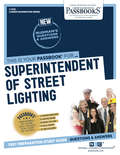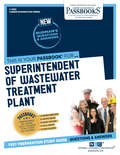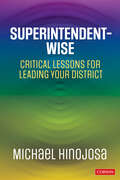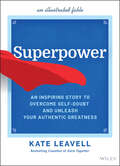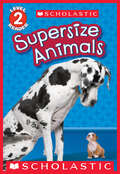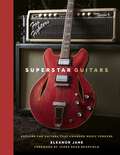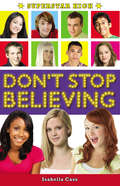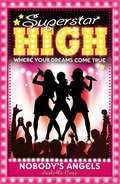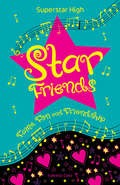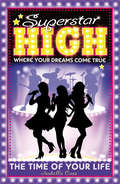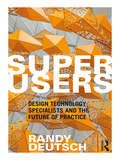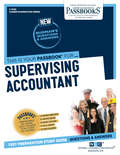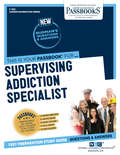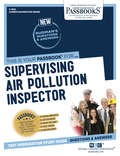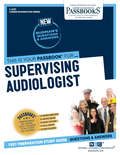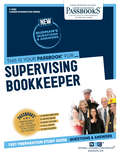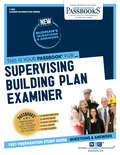- Table View
- List View
Supergifted
by Gordon KormanThe highly anticipated sequel to Ungifted from #1 New York Times bestselling author Gordon Korman. Donovan Curtis has never been what anyone would call “gifted.” But his genius friend Noah Youkilis is actually supergifted, with one of the highest IQs around. After years at the Academy for Scholastic Distinction, all Noah dreams of is the opportunity to fail if he wants to. And he’s landed in the perfect place to do it—Donovan’s school.Almost immediately, Noah finds himself on the wrong side of cheerleading captain Megan Mercury and alpha jock Hash “Hashtag” Taggart. Sticking up for Noah lands Donovan in the middle of a huge feud with Hashtag. He’s told to stay away from the sports star—or else.That should be the end of it, but when a freak incident suddenly makes Donovan a hero, he can’t tell anyone about it since Hashtag is involved. So Noah steps in and becomes “Superkid.” Now he’s gone from nerd to titan at school. And it may have gone more than a little bit to his head.This funny and heartwarming sequel to Ungifted, which has become a word-of-mouth hit, cleverly sends up our ideas about intelligence, heroism, and popularity.
Superhero Madness
by David OkumTeaches basic superhero-style drawing with clear instruction and 100s of appealing illustrations. 40+ step-by-step demos.
Superhero Street: a Storey Street novel (A Storey Street novel #2)
by Phil Earle'A laugh-out-loud read full of capes and japes! If you like Superheroes this is right down your Street!' - Danny Wallace, presenter and bestselling author. Illustrated by Waterstones Children's Book Prize shortlisted artist, Sara Ogilvie, this is the second book in Demolition Dad author Phil Earle's children's series, Storey Street. Perfect for fans of Roald Dahl, Liz Pichon and David Walliams, each book in this laugh-out-loud series focuses on a different neighbour.Mouse is desperate to be a superhero. To find that power that will make him stand out in the crowd. But his every attempt ends in failure. He can't even get any attention at home as his five brothers (triplets AND twins) take every second of mum and dad's attention. When mum foils a bank robbery while on duty as a lollipop lady, she and Mouse are lauded as superheroes. Joining forces with Mouse are The Z List - a group of unlikely crime-fighters. But in their midst is a traitor hell-bent on revenge. Will Mouse be super enough to spot this danger, and is he brave enough to do anything about it?(P) Orion Children's Books 2017
Superintendent Leadership: Applying the Educational Leadership Constituent Council Standards for Improved District Performance
by Elaine L. WilmoreWritten by leadership expert Elaine L. Wilmore, this ideal resource helps aspiring and practicing superintendents attain proficiency in the Educational Leadership Constituent Council (ELCC) standards.
Superintendent of Construction: Passbooks Study Guide (Career Examination Series #C-1500)
by National Learning CorporationThe Superintendent of Construction Passbook® prepares you for your test by allowing you to take practice exams in the subjects you need to study. It provides hundreds of questions and answers in the areas that will likely be covered on your upcoming exam.
Superintendent of Sewers: Passbooks Study Guide (Career Examination Series)
by National Learning CorporationThe Superintendent of Sewers Passbook® prepares you for your test by allowing you to take practice exams in the subjects you need to study. It provides hundreds of questions and answers in the areas that will likely be covered on your upcoming exam, including but not limited to: supervision of personnel and operations; construction and repair of sewers; preventive maintenance; interpreting sewer plans; safety; and more.
Superintendent of Street Lighting: Passbooks Study Guide (Career Examination Series)
by National Learning CorporationThe Superintendent of Street Lighting Passbook® prepares you for your test by allowing you to take practice exams in the subjects you need to study. It provides hundreds of questions and answers in the areas that will likely be covered on your upcoming exam.
Superintendent of Wastewater Treatment Plant: Passbooks Study Guide (Career Examination Series)
by National Learning CorporationThe Superintendent of Wastewater Treatment Plant Passbook® prepares you for your test by allowing you to take practice exams in the subjects you need to study. It provides hundreds of questions and answers in the areas that will likely be covered on your upcoming exam.
Superintendent-Wise: Critical Lessons for Leading Your District
by Michael HinojosaExplore transformative insights from a celebrated educational leader. In Superintendent-Wise, Michael Hinojosa, the acclaimed former superintendent of the Dallas Independent School District, shares invaluable lessons for education leaders in establishing systems that prioritize students′ health, well-being, and academic success. This engaging and essential guide introduces the Success Triangle—a framework leaders can use to develop essential relationships and effectively manage their time. The book offers actionable strategies for school leaders to collaborate with school boards, recognize and foster excellence among staff, strengthen community relations, build relationships with the media, and implement proven turnaround strategies for struggling schools. Additional features include: "Big Idea" bullet lists capturing each chapter’s main takeaways "Reflect and Act" exercises that support the implementation of strategies Quick and practical "Pro Tips" drawn from the author’s extensive experience Dr. Hinojosa’s decades of experience, pragmatic advice, and unique ability to cut through the noise offer crucial support for both new and current leaders, particularly in urban districts and high-needs communities.
Superintendent-Wise: Critical Lessons for Leading Your District
by Michael HinojosaExplore transformative insights from a celebrated educational leader. In Superintendent-Wise, Michael Hinojosa, the acclaimed former superintendent of the Dallas Independent School District, shares invaluable lessons for education leaders in establishing systems that prioritize students′ health, well-being, and academic success. This engaging and essential guide introduces the Success Triangle—a framework leaders can use to develop essential relationships and effectively manage their time. The book offers actionable strategies for school leaders to collaborate with school boards, recognize and foster excellence among staff, strengthen community relations, build relationships with the media, and implement proven turnaround strategies for struggling schools. Additional features include: "Big Idea" bullet lists capturing each chapter’s main takeaways "Reflect and Act" exercises that support the implementation of strategies Quick and practical "Pro Tips" drawn from the author’s extensive experience Dr. Hinojosa’s decades of experience, pragmatic advice, and unique ability to cut through the noise offer crucial support for both new and current leaders, particularly in urban districts and high-needs communities.
Superpower: An Inspiring Story to Overcome Self-Doubt and Unleash Your Authentic Greatness
by Kate LeavellLearn to find your own superpowers with this inspiring journey of self-acceptance In Superpower, bestselling author Kate Leavell delivers a compelling story of self-love, appreciation, and the power of sharing and connecting with those around us through vulnerability and understanding. In the book, a soccer coach tells his players about the adventures of &“the new kid&” at school who&’s afraid of being teased and bullied. Through the help of a special teacher, he and his classmates learn to overcome challenges and harness the power of seeking to understand new perspectives and viewpoints. The class experiences the power of connection inside the activities during puzzle week, and along with their new student, finds the confidence to embrace their unique traits and appreciate and celebrate the uniqueness in each other. In Superpower, you&’ll find: Games to help you discover common interests and get to know those around you on a deeper level Exercises to learn about what it means to have different perspectives and learn from the stories of others Discussion questions for deeper reflection and for group book studies An eye-opening and thought-provoking journey through difference, self-acceptance, and understanding, Superpower shows us how to impact the world for good using our very own, built-in superpowers.
Supersize Animals (Scholastic Reader, Level 2)
by Melvin Berger Gilda BergerA level 2 reader in the Scholastic nonfiction reader line featuring gigantic animals that you'll hardly believe are real!Some people are short and some people are tall, but everyone is a little different. The same is true for animals. Some animals are small and others are bigger. But did you know that certain animals grow much, MUCH larger than all others of their kind? In this level 2 reader, you'll meet oversized animals--from rabbits the size of dogs, and dogs the size of horses and so much more. They are the supersize animals!
Superstar Guitars: Explore the guitars that changed music forever
by Eleanor JaneForeword by James Dean Bradfield, Manic Street PreachersA collection that has to be seen to be believed, Superstar Guitars showcases the most famous six-strings in the history of music, in exquisite detail.Photographer Eleanor Jane has travelled the world, documenting the legendary guitars used to create some of the greatest music ever heard.Jimi Hendrix's Woodstock Stratocaster. The guitar on which Bob Dylan 'went electric'. The Fender Mustang Kurt Cobain played in the 'Smells Like Teen Spirit' video. Explore some of the most iconic guitars in music, up close and personal.Detailed photography explores every inch of these iconic instruments, telling the stories of the guitars that changed the world.Guitars featured include:Jimi Hendrix's Woodstock StratocasterKurt Cobain's 'Smells Like Teen Spirit' MustangJohn Frusciante's Fender StratocasterDave Grohl's Gibson Trini LopezNoel Gallagher's Epiphone Riviera Eric Clapton's MTV Unplugged Martin Jeff Buckley's Fender TelecasterBrian May's Red SpecialTom Morello's Arm The HomelessPhoebe Bridgers' Danelectro BaritoneJack White's Airline Prince's Yellow CloudThurston Moore's Fender JazzmasterDavid Gilmour's Black StratSteve Vai's Ibanez JEMMatt Bellamy's Mansion DeLoreanAnd many more...
Superstar Guitars: Explore the guitars that changed music forever
by Eleanor JaneForeword by James Dean Bradfield, Manic Street PreachersA collection that has to be seen to be believed, Superstar Guitars showcases the most famous six-strings in the history of music, in exquisite detail.Photographer Eleanor Jane has travelled the world, documenting the legendary guitars used to create some of the greatest music ever heard.Jimi Hendrix's Woodstock Stratocaster. The guitar on which Bob Dylan 'went electric'. The Fender Mustang Kurt Cobain played in the 'Smells Like Teen Spirit' video. Explore some of the most iconic guitars in music, up close and personal.Detailed photography explores every inch of these iconic instruments, telling the stories of the guitars that changed the world.Guitars featured include:Jimi Hendrix's Woodstock StratocasterKurt Cobain's 'Smells Like Teen Spirit' MustangJohn Frusciante's Fender StratocasterDave Grohl's Gibson Trini LopezNoel Gallagher's Epiphone Riviera Eric Clapton's MTV Unplugged Martin Jeff Buckley's Fender TelecasterBrian May's Red SpecialTom Morello's Arm The HomelessPhoebe Bridgers' Danelectro BaritoneJack White's Airline Prince's Yellow CloudThurston Moore's Fender JazzmasterDavid Gilmour's Black StratSteve Vai's Ibanez JEMMatt Bellamy's Mansion DeLoreanAnd many more...
Superstar High: Don't Stop Believing (Superstar High #3)
by Isabella CassNow halfway through their first year at the world-famous Garrick School of Performing Arts, things are hotting up for Cat, Belle and Holly - life as a superstar just gets busier!Hot on the heels of her success in the dance department show, Holly is thrilled to land an amazing duet in the end of term Musical Spectacular. But there's a lot to live up to - can she and her partner, Zak, cope with the pressure and give the performance of their life?Evil Bianca seems even more determined to annoy Belle this term, so when they end up singing together in the show, sparks fly - even Belle's gorgeous boyfriend Jack can't make her feel better.And Cat is sudenly fitting in dating around her already busy schedule when her friends concoct a Get-Cat-A-Boyfriend Plan. Will she find the boy of her dreams?
Superstar High: Nobody's Angels (Superstar High #1)
by Isabella CassHolly, Belle and Cat are first years at The Garrick School for the Performing Arts. It's one of the best stage schools in the world and the girls have a lot to prove. There's a big talent competition coming up and the three friends have entered, but will they succeed or simply make fools of themselves?The books explore the hopes, fears, fun and friendship involved as our heroines try to become superstars.
Superstar High: Star Friends
by Isabella CassHolly, Cat and Belle are best friends - and superstars in the making! As they settle into their new school - the world-famous Garrick School of the Performing Arts - they soon find out that trying to be a star can be tough. But it's also fun when your best friends are around to help you make your dreams come true - and find a touch of romance!
Superstar High: The Time of Your Life (Superstar High #2)
by Isabella CassNow well into their first term at the world-famous Garrick stage school, Holly, Cat and Belle still have a lot to prove.Holly is enjoying her new life more than ever, but for her best friends, things are not so easy. Belle is confused by her feelings for the gorgeous new boy Jack, and Cat just doesn't how she's going to cope with everything on her plate. The girls will have to stick together to make it through the rest of the term!
Superusers: Design Technology Specialists and the Future of Practice
by Randy DeutschDesign technology is changing both architectural practice and the role of the architect and related design professionals. With new technologies and work processes appearing every week, how can practitioners be expected to stay on top and thrive? In a word, Superusers. Superusers: Design Technology Specialists and the Future of Practice will help you identify who they are, the value they provide, and how you can attract and retain them, and become one; what career opportunities they have, what obstacles they face, and how to lead them. Written by Randy Deutsch, a well-known expert in the field, this is the first-ever guide to help current and future design professionals to succeed in the accelerating new world of work and technology. Providing proven, practical advice, the book features: Unique, actionable insights from design technology leaders in practice worldwide The impacts of emerging technology trends such as generative design, automation, AI, and machine learning on practice Profiles of those who provide 20% of the effort but achieve 80% of the results, and how they do it What will help firms get from where they are today to where they need to be, to survive and thrive in the new world of design and construction. Revealing the dramatic impact of technology on current and future practice, Superusers shows what it means to be an architect in the 21st century. Essential reading for students and professionals, the book helps you plan for and navigate a fast-moving, uncertain future with confidence.
Supervising Accountant: Passbooks Study Guide (Career Examination Series)
by National Learning CorporationThe Supervising Accountant Passbook® prepares you for your test by allowing you to take practice exams in the subjects you need to study. It provides hundreds of questions and answers in the areas that will likely be covered on your upcoming exam, including but not limited to: principles and procedures of accounting and auditing; accounting systems; budgeting and fiscal practices; supervision; and other related areas.
Supervising Addiction Specialist: Passbooks Study Guide (Career Examination Series)
by National Learning CorporationThe Supervising Addiction Specialist Passbook® prepares you for your test by allowing you to take practice exams in the subjects you need to study. It provides hundreds of questions and answers in the areas that will likely be covered on your upcoming exam, including but not limited to: administration and staff supervision; the treatment and prevention of addiction; current developments and problems in the addiction field; community relations; social and community resources; related current events; comprehension of pertinent written material and vocabulary; and other related areas.
Supervising Air Pollution Inspector: Passbooks Study Guide (Career Examination Series)
by National Learning CorporationThe Supervising Air Pollution Inspector Passbook® prepares you for your test by allowing you to take practice exams in the subjects you need to study. It provides hundreds of questions and answers in the areas that will likely be covered on your upcoming exam.
Supervising Audiologist: Passbooks Study Guide (Career Examination Series)
by National Learning CorporationThe Supervising Audiologist Passbook® prepares you for your test by allowing you to take practice exams in the subjects you need to study. It provides hundreds of questions and answers in the areas that will likely be covered on your upcoming exam, including but not limited to: audiology, aural rehabilitation, and various techniques of administering and interpreting audiological tests for adults and children; speech therapy, speech tests and methods of determining causes of speech defects; development of speech, hearing, and language in normal and hearing-impaired children; interprofessional relationships and coordination of information from diverse specialists; role of paraprofessionals; principles and practices of supervison and training; and other related areas.
Supervising Bookkeeper: Passbooks Study Guide (Career Examination Series)
by National Learning CorporationThe Supervising Bookkeeper Passbook® prepares you for your test by allowing you to take practice exams in the subjects you need to study. It provides hundreds of questions and answers in the areas that will likely be covered on your upcoming exam.
Supervising Building Plan Examiner: Passbooks Study Guide (Career Examination Series)
by National Learning CorporationThe Supervising Building Plan Examiner Passbook® prepares you for your test by allowing you to take practice exams in the subjects you need to study. It provides hundreds of questions and answers in the areas that will likely be covered on your upcoming exam.
